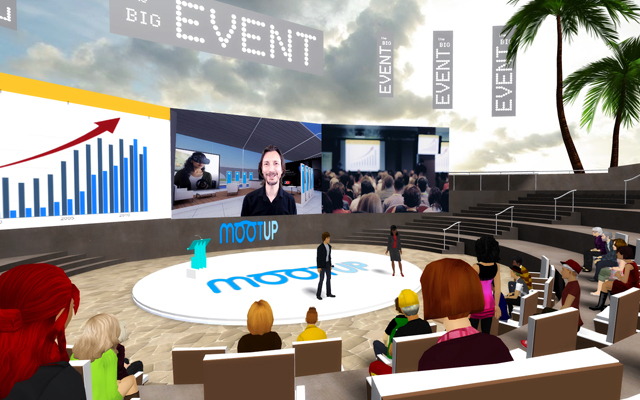Even as tradeshows, corporate meetings and exhibitions make a face-to-face comeback, the popularity for virtual events has not waned, where in certain instances, companies and organisations have chosen to create virtual environments instead.
“We’ve seen a significant increase in the number of customers coming to us wanting to replicate their in-person environments in the metaverse. Whether that be individual offices or entire corporate campuses for large organisations, businesses want to replicate their brick-and-mortar spaces in the metaverse, to allow them to host events and conferences in familiar environments,” Danny Stefanic, CEO of MootUp, shared with TTGmice.

MootUp is a metaverse virtual events platform, which is able to create virtual worlds to host meetings and events in the metaverse, providing an immersive, 3D experience. Within the platform are over one billion avatar-style combinations, with a large library for different skin, hair and eye colour, allowing attendees to create an avatar that can show their personality more accurately.
“Businesses are shifting to remote working practices, but they still need that central space where colleagues can meet up, engage and collaborate.
“It’s what I call ‘un-remote working’. While we might not be physically in the same room or building, we can still be in the same virtual room – this is the very essence of the metaverse concept,” he elaborated.
MootUp was born in June 2020 when Stefanic noticed a gap in the virtual reality market. It is a spinoff of LearnBrite – a platform that allows the creation of 3D simulations, experiences, learning modules, micro-learning and instructor-led training.
MootUp’s launch was also buoyed by the pandemic, as organisations and event planners searched for new and creative ways to host events and keep its stakeholders engaged.
One of the biggest challenges, however, is “overcoming the public’s general misunderstanding of what the metaverse actually is”, opined Stefanic.
“Businesses like MootUp have a responsibility to ensure the public can access the metaverse and embrace virtual reality – just like they did when the Internet first launched. Importantly, we are also showing how the metaverse can be practically used by companies across all sectors and industries.”
That is why, unlike other platforms, MootUp does not require users to download software or rely on specialised devices. It runs on a browser and on any device, with users able to access the metaverse with a single click on a web link.
“The majority of metaverse platforms required users to download additional software in order to access virtual environments. This was a significant stumbling block for many people navigating the metaverse for the first time,” he explained.

Aside from a wider audience reach and being able to attend a conference in the comfort of one’s living room, another key benefit is the metaverse’s “ability to improve inclusivity”.
“For instance, we can host events in more than 50 different languages, meaning there are no barriers for attendees joining from different countries. We also found that 3D avatars can help users who are sometimes reluctant to speak up in real life feel more comfortable doing so in a virtual space. These benefits cannot be underestimated.”
Moreover, virtual event hosts and organisations will be able to obtain keener insights into attendee engagement and participation, which is “data that can be leveraged when securing sponsorships”.
There is also the case for sustainability, as concern over personal carbon footprints are on the rise, so “having a suitable virtual reality alternative that requires no travel is important”, Stefanic opined.
When asked about MootUp’s future plans, Stefanic shared the company’s top priority at the moment is the launch of Hyperspace.
Hyperspace is the 3D engine that powers MootUp and is the first native web 3.0 Metaverse for Business platform. It offers a suite of customisable tools, which also includes LearnBrite and Universal Avatars – a service offering globally unique WebXR avatars for use on the Internet.
The company has also launched its Digital Twin capability, which will allow users to recreate their physical locations in the metaverse using scanning technology.





















